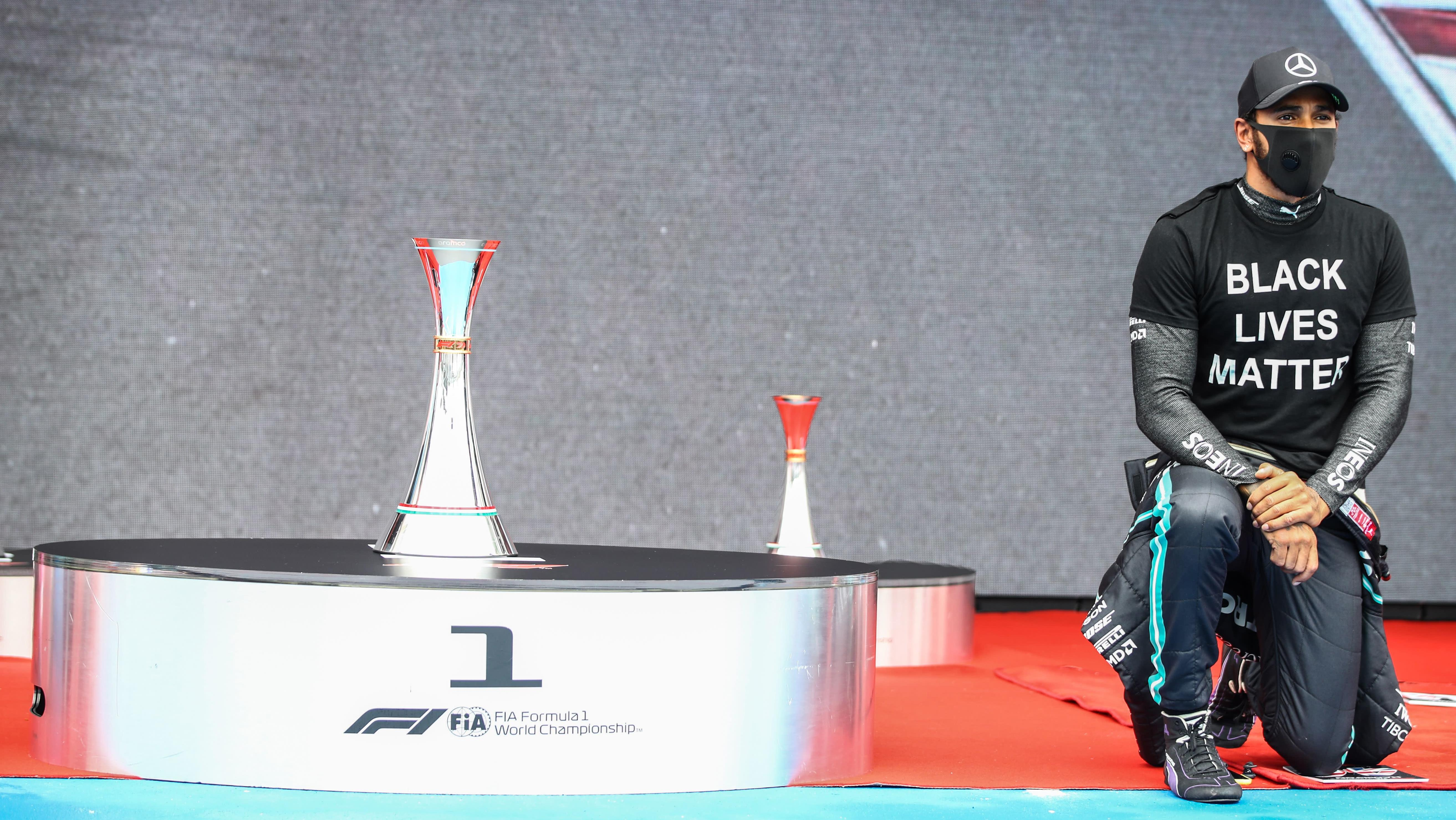Lewis Hamilton Is Not Responsible For Ending All Racism Everywhere
A quick look in the comments section of just about any tweet or article about Lewis Hamilton lately makes for a pretty disappointing time—especially regarding his recent statement that he doesn't plan to join US-based sportsmen by striking and refusing to contest this weekend's Belgian Grand Prix. While many people are upset at the decision, a good portion of them are upset for relatively disingenuous reasons, claiming that Hamilton is putting "personal gain ahead of [his] 'principles'." This is as good a time as any to remind everyone that racism is not Lewis Hamilton's problem to solve.
While Hamilton has publicly supported boycotting athletes like Naomi Osaka, he defines a difference between effective action in America versus effective action globally:
It's incredible what many out there in the States are doing within their sports, all the way down to the people that are hosting, the commentators for example.
So many people are standing with the players, and really pushing for change. It's a shame that's what is needed over there in order to get a reaction.
But that is in America, and I don't know if really me doing anything here will particularly have any effect. We're in Belgium, we're not in the United States.
[...]
I don't know how us not doing the race... it will still go on, it's a thing. But I'll still try and speak to Formula 1 to see what else we can do, to continue to raise awareness, continue to help push.
Naturally I think as a sport, I think we all need to be aligned. We all need to be supporting one another, even though it is a different sport.
Hamilton raises a good point: when an NBA team strikes, games cannot proceed. When Osaka strikes, that match cannot go forward. If Lewis Hamilton strikes, the race goes on without him.
It's already been obvious that F1 is not united in its stand against racism. At least 30 percent of the grid refuses to kneel in a coordinated display of solidarity with people of color impacted by systemic racism. Kimi Raikkonen's only contribution to the series's anti-racist video is "I stand."
For a strike to have any impact in F1, the entire grid would have to step back from the event. If six drivers compete, there's a good chance other drivers will succumb to team or sponsorship pressure to race as well.
If only Hamilton sits out, it won't be a particularly grand gesture. It would not force media to cover racial injustice—which is what the NBA is attempting to encourage by ceasing events. The Belgian Grand Prix will still go on. Everyone can easily ignore the one driver who has opted out of the race. Hamilton's gesture thus means next to nothing.
Sebastian Vettel, director of the Grand Prix Drivers Association, echoed Hamilton's sentiments and suggested possibilities for the future:
I think the message that has been taken in the U.S. with some players boycotting or going on strike, not going out for the game and therefore the games having to be postponed... I think they are more U.S.-specific.
[...]
(A future boycott) is something that we would decide together. Generally we talk about stuff, we talk about things that are going on and things that are important to us. I think we've grown together as a group of drivers. The more experienced drivers, the young drivers, I think we share our opinions.
"I don't think it makes much sense now to go as far as that because nothing is on the table, there is no reason to boycott a race. But I'm sure if we are unhappy, we would talk about it first and then take the actions accordingly.
While racism is not solely confined to the United States and is certainly prevalent in European countries, Vettel does have a point. The impact is not the same with a sport structured so differently than the one-on-one competition of the boycotting US sports. Hamilton striking at US Grand Prix in the midst of that country's racial unrest would make more sense; doing so in Belgium simply sees the sport's only black driver marginalized in the sidelines. It would arguably be far more impactful for Hamilton to race at Spa and secure another win that further extends his championship lead if his fellow drivers won't stand by his side.
Again, racism is not solely Lewis Hamilton's problem to solve. It requires a concerted effort from the whole Formula One grid, something that just isn't going to happen in its already divisive climate. If you want to hold Hamilton accountable for the greater impact of racism, try asking why his fellow drivers won't do something as simple as kneel instead.
Prejudice is not a problem that can be solved by one man, one race, or one gender. It's something that requires a united attack from everyone. If Hamilton isn't going to be backed by his fellow drivers, hold those other drivers accountable for their actions. Their decisions are not Hamilton's responsibility.
